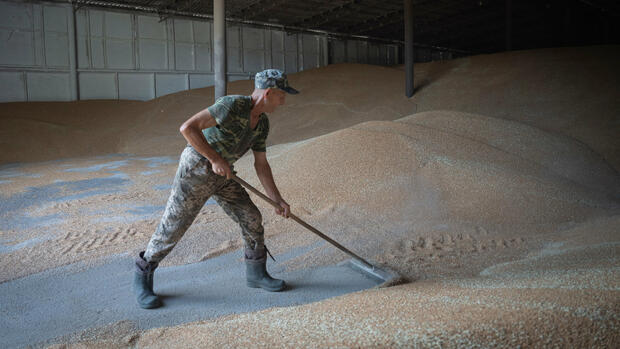Vienna Ukraine is dependent on its agricultural exports – and not only faces obstacles in the Black Sea. Poland, Hungary and Slovakia still do not allow Ukrainian imports of grain and some other agricultural products, although the EU Commission allowed the corresponding embargo to expire on Friday evening.
Ukraine doesn’t want to accept this. In an interview with Politico, the deputy economics minister announced a lawsuit against the three countries. “It is important to prove that these actions are legally wrong,” he said. Kiev is also preparing retaliatory measures against Polish fruit and vegetable exports.
There has been a long-standing debate about whether Ukrainian agricultural products should be allowed to enter the EU market freely. Several Eastern European member states are resisting this
A corresponding deal with the EU Commission allowed Hungary, Poland, Slovakia, Romania and Bulgaria to restrict trade in products such as wheat, corn, rapeseed or sunflowers from Ukraine on their markets, while at the same time continuing to enable transit. The agreement reached in June also included an EU aid package for farmers in the five countries.
Their operations are significantly less efficient than those in Ukraine. This has been a problem for the region’s farmers since Ukrainian agricultural companies have been transporting part of the harvest out of the country overland via Eastern Europe. Some of the goods are left there and, according to agricultural representatives, are depressing prices. In addition, logistics and storage capacities would be overloaded.
The port has become significantly more relevant for Ukrainian export trade as a result of the war.
(Photo: Reuters)
Since June 2022, when Ukraine received accession candidate status, all import duties on Ukrainian imports into the EU have been suspended. The EU Commission wanted to economically support the country attacked by Russia.
Criticism from Warsaw was particularly sharp before the deal expired, even though the country generously supplied Ukraine with weapons in the fight against Russia and took in many refugees. “We must take measures to restrict the import of Ukrainian goods,” Poland’s Agriculture Minister Robert Telus said last week. If this does not happen, Ukraine will not be agreed to EU membership. Hungary’s agriculture minister had also threatened to stop Ukrainian imports in order to protect the country’s farmers.
Immediate response from Poland
This created a delicate situation for the EU Commission. On the one hand, the trade policy of the confederation of states is its sovereign territory. On the other hand, rebel members are undermining the EU’s efforts to demonstrate unity in the face of the war in Ukraine.
The Commission’s decision puts the EU to the test. Poland was the first country to react. As of midnight, no more Ukrainian grain will be allowed into the country, said Prime Minister Mateusz Morawiecki shortly after the decision was announced. Shortly afterwards, Hungary also imposed an import ban on 24 Ukrainian agricultural products. Slovakia later joined the two countries. Their import ban applies to wheat, corn, rapeseed and sunflower seeds.
There is a lot at stake for Ukraine. With the war, agriculture has become even more of a pillar of their export economy. From January to July this year, agricultural goods accounted for 63 percent of goods exports. The country needs the foreign currency generated to finance the defense and continued existence of the state.
>> Read here: How the war in Ukraine strengthens Poland
This has recently become more difficult again. The agricultural industry expects that the grain harvest will be higher this year than in 2022 thanks to the good weather. But conditions were also favorable elsewhere, for example in Brazil, Argentina and the USA. As a result, a lot of grain and soy are currently coming onto the market, which is driving prices down. After a war-related high, wheat currently costs about the same on the world market as it did two years ago.
Exports via Romania
The relatively low price makes the high logistics costs even more burdensome for Ukrainian agricultural exporters. Since the grain agreement with Russia expired, exporters have had to make do with overland routes via Eastern Europe and the route via the Danube and the Black Sea port of the Romanian city of Constanta. Before the war in Ukraine, the ports on the Danube were no longer important as export gateways.
The war is affecting the country’s agriculture.
(Photo: dpa)
That has now changed, which is why the route is to be expanded further. Romania’s transport minister said on Friday that they want to double the transit capacity for Ukrainian grain in the coming months.
Ukrainian agriculture depends on it. According to industry representatives, farmers are currently making losses with wheat. “And the longer the goods have to be stored due to transport bottlenecks, the greater the loss,” says an agricultural manager.
More: The scary boom – on-site appointment at a Polish arms fair
